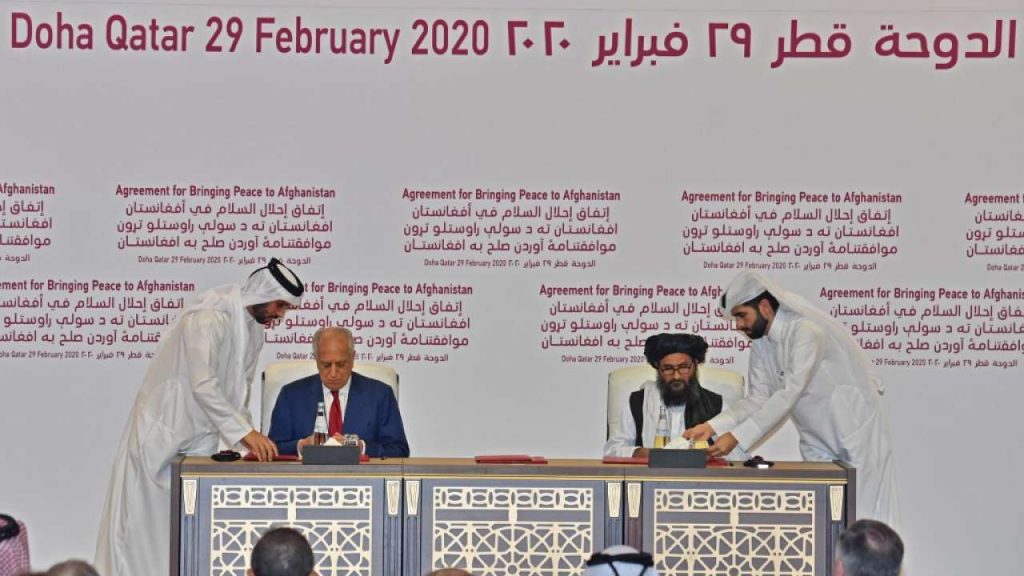A peace deal between the United States and the Taliban is taking effect in Afghanistan – the landlocked nation that has been through trying times for long years. Hit by invasions from the erstwhile USSR and the US and interspersed with a five-year rule of the Islamic fundamentalists, Afghanistan has probably seen it all. A US-orchestrated democracy initiative is failing to take roots, as election processes have repeatedly been proven to have gone awry. What next is a big question.
The nation continues to be in the iron grip of warlords, who are keeping provinces under their command and control, while government machinery is functional only in the national capital Kabul. The US will now be pulling out its remaining troops, save for a small contingent, and bid good bye to Afghanistan which it sought to ‘guide’ for the past 19 years through proxies – and at the same time could do little to effect a turn-around of fortunes of the tribes-dominated nation.
The Taliban, which signed a peace pact with the US, has the support of Russia and Iran, as also of Pakistan which brokered the present deal through the Doha initiative. Where Pakistan is, China too is sure to reach out. This could mean a virtual isolation for India in the region in the future.
Taliban has been on a roll for decades, having run the nation on its Islamic and sharia dictates, indulging in large-scale violence and making life of women more miserable than that of men. It was against women getting educated and going to work; and public flogging was its pastime. With the US signing a peace deal with these outfits, the scenario is set to further worsen. All of America’s proclaimed efforts to spread democracy and freedom for individuals there are bound now to come to naught.
For President Trump, what works good for the US is fine, irrespective of any ideological constraints. Keeping American soldiers on foreign soil with no benefits whatsoever made no sense to him. Feelings are also that the Americans bled Afghanistan clean in the past over two decades; allegedly having a finger in the pie vis-à-vis the operations of international drug cartels based in a region rich with opium cultivation.
History in Afghanistan has had its sudden twists and turns in recent decades. The US turned its eye on Afghanistan after the Communists organised a coup and overthrew the monarchy in 1978, which saw the Islamic militants in the war mode and Soviet Union stepping in with military support to help the Communists. The militants styled as mujahideen fought pitched battles with the Soviet soldiers and the local government for 10 years. The US, at the height of Cold War, extended support to the mujahideen to drive out the Soviets. Armed by the US, Bin Laden and others of his ilk reached Afghanistan, helped in the ouster of the Russians, only to later turn themselves against the US.
Taliban ruled Afghanistan for five years until the time of the Al Qaeda attacks on the US came in 2001. An incensed president George Bush Junior sent in the US military to overthrow Taliban and take effective control of Afghanistan for a while, and then handed it over to local, pro-US political groups. While the US helped Hamid Karzai to run the nation, Bush abruptly pulled out a large part of his troops from Afghanistan for deployment in Iraq, following the overthrow of Saddam Hussein. The work to strengthen democracy in Afghanistan remained undone.
While uncertainty persists in Afghanistan after the presidential polls last September – the final results of which were re-declared recently – the future of Afghanistan is anybody’s guess now. Pakistan can be trusted to complicate the scenario and, as a matter of first priority, seek to rid India of the importance it enjoyed in that country for long years – from the time of highly revered Frontier Gandhi.
In recent years, India’s role in Afghanistan was supplementary and complementary to the US role. In the changing circumstances, with the US stepping aside, the democratic governance system itself facing a serious crisis, the Taliban out to make a kill yet again, and Pakistan gaining more prominence, a safe guess is India might now have very little of leeway there. Chances are also that this may have adverse consequences to India in relation to the situation in the neighborhood.
